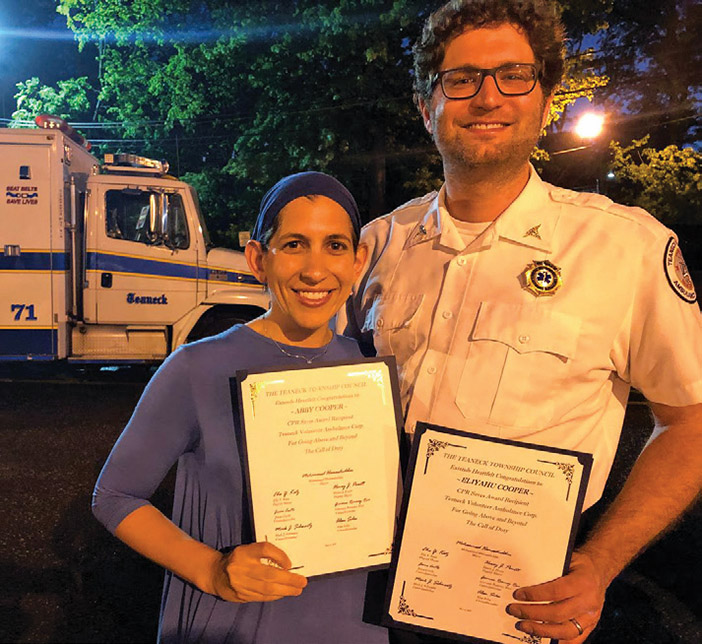

Many people have taken a course in CPR and first aid and learned to count chest compressions. Others might carry a hygienic barrier for performing mouth to mouth resuscitation or have done other types of emergency preparation in case they witness someone who needs assistance. For the majority of these prepared individuals, courses are “just in case,” or to certify for a job, and many people have only a vague sense that the skills might actually be needed one day.
But Abby Cooper of Bergenfield is no stranger to first aid and medicine in general. Working as an EMT from 2003 to 2009, she also has a background in medicine. She would never ignore a situation where help is needed, so when she saw someone drive into a tree near the Department of Public Works on River Road in Teaneck, her first thought was to immediately call 911.
However, something told her that just calling 911 was not going to be enough so she turned her car around and stopped. “I got out of the car to look and the driver was unconscious and leaning against his steering wheel,” said Cooper.
Another car stopped, and the other driver, an off-duty police officer from Dumont, came to help. Together they flagged down a DPW worker who helped break open the car window. After a quick check, Cooper assessed that the man was not breathing and did not have a pulse. “We have to start CPR,” Cooper recalled shouting. Together they pulled him out of the car and the Dumont officer started compressions. The ambulance pulled up shortly thereafter. Cooper and the EMTs were able to shock him as they continued CPR. They loaded him into the ambulance and Cooper had no idea what happened next.
About a week later, the man’s brother reached out to her and let her know that the man was revived on the way to the hospital. He called her to thank her for saving his brother’s life. “I learned from this that when you see something, do not hesitate to act because you never know when a small act will make a huge impact.”
Cooper’s experience mirrors another community member’s recent actions. According to the post from TVAC’s Facebook page, Sean Rosenzweig, an off-duty EMT with Hillsdale Volunteer Ambulance Service, was at a game at the Teaneck armory when a man collapsed. Rosenzweig determined that the individual had stopped breathing and lost his pulse. He immediately began CPR while bystanders called 911, and he was applying AED shocks before TVAC arrived. The ambulance staff, of which Abby Cooper’s husband, Eliyahu Cooper, was a part, had to apply one more shock en route to the hospital, but the efforts of Rosenzweig, combined with the swift TVAC response, helped save this man’s life as well.
Eliyahu Cooper added that public defibrillators make a big difference in changing the outcome when someone collapses. This was another factor that helped in the scenario at the armory.
On May 15, TVAC recognized the acts of these and other bystanders whose quick thinking helped save the victims. Rosenzweig and the Coopers, along with other members of the emergency call were presented with awards for their life saving actions.
Neither of the Coopers, nor Rosensweig, see themselves as heroes, and they even preferred to stay out of the public eye and had to be encouraged to speak publicly about it. When reached, the Coopers said that what they would most want to communicate and emphasize was the fact that CPR knowledge and quick action saved lives in these instances.
Ryan Shell, captain of the Bergenfield Volunteer Ambulance Corps, spoke to The Jewish Link about the need for quick action from civilians. “In today’s day and age, with the availability of CPR classes, every single adult should be trained in CPR,” he said. Having seen firsthand the positive impact of CPR being administered within moments of an individual collapsing, he knows that this knowledge saves lives.
However, Shell made a further request. He acknowledged the tremendous ahavat Yisrael that marks these communities, and the desire for acquaintances to want to be involved, but added, “Once help arrives it’s important for bystanders to step away. Patients need their privacy and are often already embarrassed that they’re sick or injured. Second, bystanders can get in the way of responders.” Unless EMTs ask for help, please remember to give space to those tending to the immediate needs of the situation.
For anyone looking to broaden their knowledge of CPR and other important life-saving skills, Shell and many responders encourage civilians to check with the American Heart Association (cpr.heart.org) for classes in their area.
By Jenny Gans









